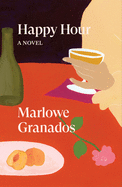
 Two young women vacationing in New York City immerse themselves in borrowed luxury while skewering the city's so-called sophisticates in this sharp and beguiling debut from filmmaker and critic Marlowe Granados. Granados's nuanced characterization, biting observational humor and intoxicating prose make Happy Hour a delicacy to be savored, as well as a poised takedown of New York's cultural elite.
Two young women vacationing in New York City immerse themselves in borrowed luxury while skewering the city's so-called sophisticates in this sharp and beguiling debut from filmmaker and critic Marlowe Granados. Granados's nuanced characterization, biting observational humor and intoxicating prose make Happy Hour a delicacy to be savored, as well as a poised takedown of New York's cultural elite.
Isa and Gala are international travelers who have just arrived in New York for the summer. Isa is Salvadorean and Pinay, and Gala is from Bosnia. Though they've made short-term living arrangements, their finances are precarious and their travel visas expired or nonexistent--technically speaking, they shouldn't be in the country at all. Rather than quibble over such details, the girls devote themselves fully to the thrills of the moment, propelled by their own whims and their search for complimentary cocktails and food. Amused by the bland pretensions of New York's young intellectual aristocracy ("They seem to find hardship fascinating--dirty hair but suspiciously straight teeth"), Isa keeps a diary detailing her encounters with them, a task she describes as "fieldwork." Her observations are joyfully acerbic, though never without depth or sensitivity. "It's funny how in a place where everything is an Experience, people see such little value in just living," she muses. "People are always nostalgic about the New York they've read about. They are always trying to recreate those feelings, that mystique. It always ends up cheap, garish, and the worst crime of all, inauthentic."
Burning through a loose assortment of friends and acquaintances, Isa and Gala ultimately clash with each other, forcing a reexamination of their bond and an ominous confrontation with the hidden forces that move them. Though hedonism can be healing, no party can last forever--the gray light of a new dawn eventually looms. "Fun is fun but," Isa observes, "a girl can't go on laughing all the time."
Granados's sparkling wit and droll humor add a sharp edge to her sumptuous descriptions of the city's decadent nightlife. The defiant vulnerability of her protagonists infuses the gleefully irreverent narrative with depth, poignancy and warmth. "We have tried to make it a habit to leave right before last call because it really is sobering to be at a place when the lights come on. The dream is over and it's time to go home," Isa reflects, "wherever that is." --Devon Ashby, sales and marketing assistant, Shelf Awareness
Shelf Talker: In this wryly observed novel, a pair of young women embrace the distractions of New York's upper crust while gleefully dissecting its bland, overprivileged exemplars.

